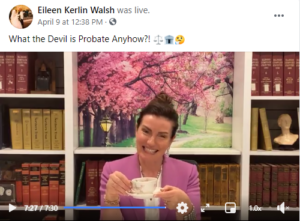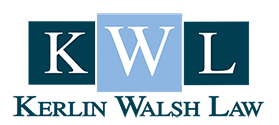An excerpt transcript from Spring Tea with Kerlin Walsh Law weekly Facebook LIVE video, recorded 4/9/21.

Welcome to Spring Tea with Kerlin Walsh Law. My tea today is not Irish tea, it’s lemon-ginger and it is delicious.
Today we’re going to talk about probate, and answer the question, “What the heck IS probate?”
Many of you come to me saying one of your aims is to avoid probate. That’s because you may have heard it’s a bad thing, or you’ve just been unfortunately educated through a family member or an estate having to go through probate, and you’ve gotten to see how messy, public, long-winded and expensive that is.
Probate is a court process. Really it’s a way to switch title. If we pass with something in our name only, no beneficiary, no Trust, no joint tenant, then there has to be a legal way for that to go to whomever the law would determine it belongs to. So when we die with either adequate planning or no planning, there has to be this process.
The process is filing the petition, opening up a probate, having an administrator appointed, publishing claims notices, getting letters of office, keeping it open for six months here in Illinois, all the legal documents to open, the administration during it, and then the closing afterwards. It’s typically about a one year process. For an example of typical costs, let’s say we have a home and a large account, maybe a car and some personal property: the cost of probate is typically $7,500 to $10,000, maybe about $1,200 with court costs and filing fees, and then if we don’t have a Will and we have to file a bond, then that’s another $1,500. And if it goes on after a full year, then we have to renew that bond and pay it again.
Let me give you a couple of examples of where probate might be needed.
Mom and Dad have almost everything jointly, they have their home jointly, they have an investment account jointly, their bank account jointly, Mom stayed at home, Dad worked for many years and his 401(k) rolled into an IRA. Dad passes away. The home is fine, the investment and bank accounts are fine because Mom is a joint tenant. But, it’s discovered that the IRA moved from one financial house to another, and had no beneficiary. The IRA is $200,000. Any time you go over $100,000 in the state of Illinois, you have to take that account to probate if there is no beneficiary. That’s what would have triggered the probate in that case.
Fast forward. Dad passed away and Mom got a Will. Now she doesn’t have a joint tenant on the investment account or checking account because her husband has predeceased her, and she still has her home. So then upon Mom’s death, the family feels that since “Mom had a Will, we’re all going to be fine.” Then they discover that there was a beneficiary this time on the bank account that was payable on death. There was a beneficiary on the investment account. But the home? It was still in Mom and Dad’s name. Mom and Dad are both now gone. The Will says to leave everything to their five children, but we need a legal mechanism to change that title, and the Will does not do that. So we have to go to probate court with that Will.
It’s often a home that triggers a probate. In my office at this moment, we have 12 cases going through probate. Eight of them have been triggered by a home, and four of them by a large account that didn’t have a beneficiary on it. Now, that doesn’t mean there were 12 families that didn’t plan. There were four of them that didn’t do any planning, but there were five of them that had a Will but no Trust, hence the home having to go to probate. Then we had a few with a Will and a Trust, but the Trust wasn’t fully lined up with the assets.
It’s unfortunate when we have to go into probate, because there are many ways to avoid it if you keep these three things in mind. If you have a joint tenant on an account, that’s not going to trigger probate. If you have a beneficiary or a payable upon death on the account, that’s not going to trigger probate. Or, if you have a Trust. With all of those cases that are in probate, because of the home, that cost may be between $10,000-$15,000 each to get on the other side of that. And it could have been taken care of with a $2,000 Trust.
Estate planning is an investment. It’s an investment of your time and money at any time, but it’s a “stitch in time saves nine”.
If I ask any of my clients, would you rather pay $2,000 now (for example, as the costs could be higher or lower on each end) to get the Trust, have the property protected, and go to your children privately; or, pay $15,000 later as it goes through a public process, have a claims notice put in the paper? They are going to choose that private, much faster and smoother Trust, with less hassle on the family during a difficult time when the parents have passed. They’re going to choose that earlier route, that stitch in time, every single time.
Probate is not a monster. It’s a very necessary legal process that’s in place. This might surprise you, or you may have heard me say this before, that almost 50% of people still don’t have any estate planning done at all at their death. Those courts are very, very busy. Right now, we’re not getting hearings for maybe 6-8 weeks out, because those courts are backed up. But, there are many ways to avoid it. The most common one for my clients, for people just like you, is a Trust. That is your food-for-thought for today.

I am going to leave you with a quote from Mark Twain,
“The fear of death comes from a fear of life. Those who live their lives fully are prepared for death at any time.”
So, here’s to living fully in our lives, every single day. Keep enjoying the spring, and I will see you next Friday with Spring Tea with Kerlin Walsh Law. Thanks, and bye.
Watch the recording from Facebook LIVE 4/9/21

